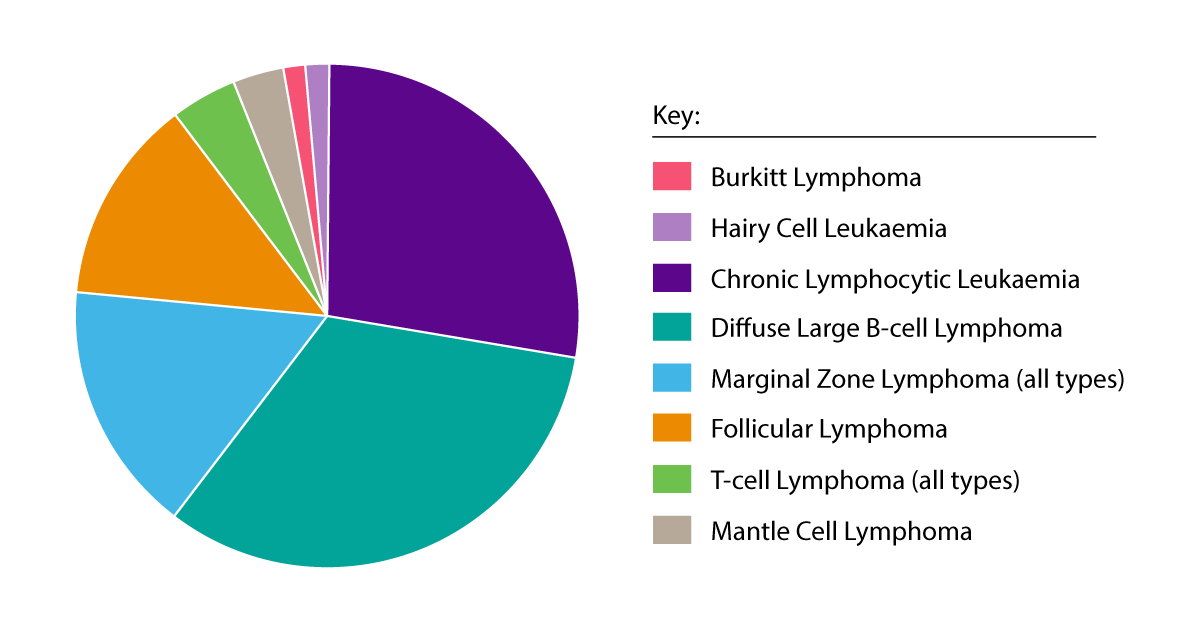You’ve probably heard of lymphoma, which is a cancer that begins in the lymphocytes. You may have even heard of the two main types, Hodgkin and non-Hodgkin lymphoma. What you may not know, however, are the differences between each and how the classification affects treatment. These two types of cancer have different etiologies, prognoses, and may require different approaches to treatment.

Defining Lymphoma
Lymphoma is a type of cancer that specifically begins in B-lymphocytes, which are specialized cells in the body that fight infection. Your lymphatic system is a part of your immune system, and you can find b-lymphocytes in your lymph nodes, bone marrow, spleen, and more. Since your lymphocytes are widespread, cancer that begins in them can grow and spread quickly.
Many people may confuse lymphoma with leukemia. Though they both can be aggressive forms of cancer, leukemia attacks cells in your bone marrow which is responsible for producing blood cells (leukocytes).
The Two Main Types of Lymphoma
Lymphoma is an aggressive cancer, and early detection and intervention is essential. There are two main types of lymphoma: Hodgkin and non-Hodgkin lymphoma.
Hodgkin Lymphoma
Hodgkin Disease, or Hodgkin Lymphoma, is named for the man credited with pioneering research about it, Dr. Thomas Hodgkin. When a physician suspects lymphoma, they will perform a biopsy on the suspected lymph node. A pathologist ultimately looks for the telltale sign of Hodgkin Lymphoma, which are called Reed Sternberg cells.
The presence of a Reed Sternberg cell is readily identifiable because they are five times larger than ordinary lymphocytes. The cells additionally have two nuclei and can resemble popped kernels of popcorn. When a pathologist identifies the presence of these Reed Sternberg cells, they can confidently say that a person has Hodgkin’s Disease.
Non-Hodgkin Lymphoma
Every other type of lymphoma is lumped under the category of non-Hodgkin lymphoma. In general, non-Hodgkin’s lymphomas are more prevalent than Hodgkin’s lymphoma and can have a wide range of pathology. While most cases of Hodgkin’s lymphoma present similarly, non-Hodgkin’s lymphomas can be very different from person to person.
Identification of Hodgkin’s or non-Hodgkin’s lymphoma is essential because it will ultimately guide the treatment plan. While both can respond readily to treatment, interventions must be targeted to address the underlying pathophysiology of the disease
How Are Hodgkin’s and Non-Hodgkin’s Lymphoma Different?
Other than the presence of Reed Sternberg cells, Hodgkin and non-Hodgkin lymphomas have several notable differences.
- Point of origin. Non-Hodgkin’s lymphoma can appear in any part of the body, but Hodgkin’s lymphoma usually starts in the neck, chest, or armpits.
- Average age of onset. In general, Hodgkin’s lymphoma affects younger people, with the largest group affected in the 20-34 age range. Non-Hodgkin’s lymphoma, by contrast, is most likely to affect those over the age of 60.
- Prevalence. Non-Hodgkin’s lymphoma is much more common than Hodgkin’s lymphoma, likely because it encompasses a wider range of pathologies. For example, there are only six different kinds of Hodgkin’s lymphoma, and 60 types of non-Hodgkin’s lymphoma.
- Prognosis. Ultimately, people with Hodgkin’s Lymphoma have a better prognosis than those who have non-Hodgkin’s lymphoma. This could be explained, however, by the fact that patients with Hodgkin’s lymphoma tend to be younger and in better overall health. The five year survival rate of Hodgkin’s lymphoma is nearly 90%, while the 5 year survival rate for non-Hodgkin’s is 75%.
Risk Factors for Lymphoma
Like all other cancers, some people are more likely to get lymphoma than others. The more risk factors a person has, the more likely they are to develop lymphoma. Though the two types of diseases differ slightly, the risk factors are similar. You are more at risk if:
- Your biological sex is male.
- You have a weakened immune system (i.e., you are HIV positive or have undergone an organ transplant).
- You have an autoimmune disease such as ulcerative colitis or rheumatoid arthritis.
- You have Hepatitis C or Epstein Barr virus.
- You have a family history of lymphoma.
- You received radiation for another type of cancer.
- You have had high exposures to pesticides, particularly those containing benzene.
While these risk factors can increase the likelihood of developing lymphoma, the presence of one or even several does not necessarily mean you have the disease. Always discuss any health concerns with your primary care physician.
Treatment for Lymphoma
Fortunately, both Hodgkin’s and non-Hodgkin’s lymphoma respond well to treatment, particularly if they are caught early. Treatment of lymphoma will depend on your overall health and stage of the disease. Some of the most commonly utilized treatment options include:
- Active surveillance. In some cases, lymphoma can be a slow growing cancer. When utilizing this approach, you will routinely meet with your doctor and report about your symptoms and how they affect your daily life. If the disease begins to spread, it may require treatment.
- Chemotherapy. This treatment works by administering medication that attacks fast growing cells in the body. Since cancer cells are fast growing, they are vulnerable to this type of medication, which may come in IV or pill form.
- Immunotherapy. Though this is still in its earliest stages, immunotherapy medications work by using the body’s own immune system to attack cancer cells. The main advantage of this type of therapy is that it does not attack healthy tissues like chemotherapy.
- Radiation. Radiation therapy involves aiming specialized rays – such as x-rays and protons – at the site of the cancer to shrink it in size. Since lymphoma can quickly become widespread, radiation is only effective in certain situations (such as when cancer is isolated to a certain swath of lymph nodes).
- Transplants. Stem cell or bone marrow transplants involve high doses of radiation and chemotherapy in an effort to suppress your own bone marrow. Then, transplanted, healthy bone marrow effectively replaces it.
- Clinical trials. For aggressive forms of lymphoma that do not respond well to traditional treatments, clinical trials may be another option. These small scale, innovative treatments may be effective in the treatment of aggressive lymphomas, but do not have the testing or FDA approval to be first-line treatments.
Questions to Ask a Doctor About Lymphoma
If you are facing a lymphoma diagnosis, you are likely confused and scared. These feelings are normal and can also prevent you from learning more about your condition from your physician. Your appointments may be full of technical terminology, so it is important to ask your doctor plenty of questions about your conditions, including:
- Is my lymphoma aggressive or slow-growing?
- What type of treatment do you recommend?
- What stage is my lymphoma?
- Has the lymphoma spread? If so, where?
- Will I need surgery? Chemotherapy? Radiation? A bone marrow transplant?
- What are the possible short-term and long-term side effects of the proposed treatment plan?
- How can I expect treatment to affect my everyday life?
- Can you explain the pathology report to me?
- Who will be the physician in charge of my care? Who can I call with questions?
- How long will the treatment take to administer?
Both Hodgkin’s and non-Hodgkin’s lymphoma are serious medical conditions that can be life threatening, especially without prompt intervention and treatment. However, the survival rate for both types of lymphoma are generally high, especially compared to other types of cancer.
Knowing the type, stage, and goal of treatment regarding a lymphoma diagnosis can help the person affected better prepare for the journey that lies ahead.
Some kinds of lymphoma, particularly non-Hodgkin’s lymphomas, may not be discovered until the disease is in advanced stages. It is important to participate in preventive wellness checks and keep your primary care physician of any daily symptoms you may experience, especially unexplained weight loss or persistent fatigue.
Cancer Drugs
Cancer drugs approved by the Food and Drug Administration (FDA) for non-Hodgkin lymphoma as common drug combinations are;
Getting the right balance for your health is what we’re all about. If you have questions or concerns with any medications we can help you walk through this complicated terrain. Contact us and we’ll help you find what will be the very best approach for your specific individual needs.
Please talk to your doctor or reach out to us and make headway with your questions about lymphoma.
Chief Operating Officer, The Compounding Pharmacy of America
Matthew Poteet, Pharm.D. graduated with Honors from Lee University with a Bachelors of Science in Biological Science. After his undergraduate training, he completed the Doctor of Pharmacy program at Mercer University Southern School of Pharmacy, graduating in 2004. Dr. Poteet has spent much of his pharmacy career on staff at two of the most prestigious academic teaching hospitals in the Southeast; Emory University in Atlanta and Vanderbilt University Medical Center in Nashville. At these institutions he received extensive experience and training in sterile products compounding.
He returned home to East Tennessee in 2010, where he has held the position of Pharmacy Director at two sterile products pharmacies in Knoxville. Matthew lives in Knoxville with his wife, Chris. Dr. Poteet is Tennessee’s first Board Certified Anti-Aging Pharmacist by the American Academy of Anti-Aging Medicine.




 Subscribe to Our Newsletter
Subscribe to Our Newsletter


